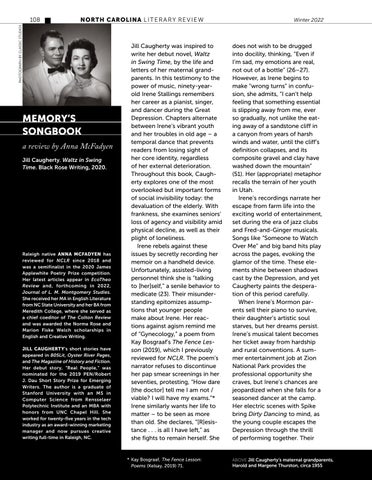NORTH CAROLINA L I T E R A R Y RE V I E W
PHOTOGRAPH BY CLASSIC STUDIOS
108
MEMORY’S SONGBOOK a review by Anna McFadyen Jill Caugherty. Waltz in Swing Time. Black Rose Writing, 2020.
Raleigh native ANNA MCFADYEN has reviewed for NCLR since 2018 and was a semifinalist in the 2020 James Applewhite Poetry Prize competition. Her latest articles appear in EcoTheo Review and, forthcoming in 2022, Journal of L. M. Montgomery Studies. She received her MA in English Literature from NC State University and her BA from Meredith College, where she served as a chief coeditor of The Colton Review and was awarded the Norma Rose and Marion Fiske Welch scholarships in English and Creative Writing. JILL CAUGHERTY’s short stories have appeared in 805Lit, Oyster River Pages, and The Magazine of History and Fiction. Her debut story, “Real People,” was nominated for the 2019 PEN/Robert J. Dau Short Story Prize for Emerging Writers. The author is a graduate of Stanford University with an MS in Computer Science from Rensselaer Polytechnic Institute and an MBA with honors from UNC Chapel Hill. She worked for twenty-five years in the tech industry as an award-winning marketing manager and now pursues creative writing full-time in Raleigh, NC.
Jill Caugherty was inspired to write her debut novel, Waltz in Swing Time, by the life and letters of her maternal grandparents. In this testimony to the power of music, ninety-yearold Irene Stallings remembers her career as a pianist, singer, and dancer during the Great Depression. Chapters alternate between Irene’s vibrant youth and her troubles in old age – a temporal dance that prevents readers from losing sight of her core identity, regardless of her external deterioration. Throughout this book, Caugherty explores one of the most overlooked but important forms of social invisibility today: the devaluation of the elderly. With frankness, she examines seniors’ loss of agency and visibility amid physical decline, as well as their plight of loneliness. Irene rebels against these issues by secretly recording her memoir on a handheld device. Unfortunately, assisted-living personnel think she is “talking to [her]self,” a senile behavior to medicate (23). Their misunderstanding epitomizes assumptions that younger people make about Irene. Her reactions against agism remind me of “Gynecology,” a poem from Kay Bosgraaf’s The Fence Lesson (2019), which I previously reviewed for NCLR. The poem’s narrator refuses to discontinue her pap smear screenings in her seventies, protesting, “How dare [the doctor] tell me I am not / viable? I will have my exams.”* Irene similarly wants her life to matter – to be seen as more than old. She declares, “[R]esistance . . . is all I have left,” as she fights to remain herself. She
* Kay Bosgraaf, The Fence Lesson: Poems (Kelsay, 2019) 71.
Winter 2022
does not wish to be drugged into docility, thinking, “Even if I’m sad, my emotions are real, not out of a bottle” (26–27). However, as Irene begins to make “wrong turns” in confusion, she admits, “I can’t help feeling that something essential is slipping away from me, ever so gradually, not unlike the eating away of a sandstone cliff in a canyon from years of harsh winds and water, until the cliff’s definition collapses, and its composite gravel and clay have washed down the mountain” (51). Her (appropriate) metaphor recalls the terrain of her youth in Utah. Irene’s recordings narrate her escape from farm life into the exciting world of entertainment, set during the era of jazz clubs and Fred-and-Ginger musicals. Songs like “Someone to Watch Over Me” and big band hits play across the pages, evoking the glamor of the time. These elements shine between shadows cast by the Depression, and yet Caugherty paints the desperation of this period carefully. When Irene’s Mormon parents sell their piano to survive, their daughter’s artistic soul starves, but her dreams persist. Irene’s musical talent becomes her ticket away from hardship and rural conventions. A summer entertainment job at Zion National Park provides the professional opportunity she craves, but Irene’s chances are jeopardized when she falls for a seasoned dancer at the camp. Her electric scenes with Spike bring Dirty Dancing to mind, as the young couple escapes the Depression through the thrill of performing together. Their
ABOVE Jill Caugherty’s maternal grandparents,
Harold and Margene Thurston, circa 1955






























